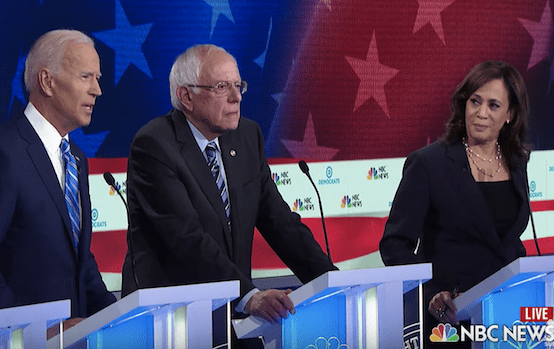Democrats: Back to Being the ‘Amnesty and Abortion’ Party

The latest round of Democratic presidential candidates debates resembled something of a circular firing squad, with far-left candidates seeking to blast away the chances of their more moderate colleagues. It’s as though some of the contenders—and all of the likely nominees, according to polling and fundraising reports—think he or she who takes the most extreme left-wing positions will be the nominee.
One of the most talked about exchanges from the first debate came after former Maryland congressman John Delaney suggested his party eschew “fairytale economics” in favor of “kitchen table, pocketbook issues that matter to hard-working Americans.” Without missing a beat, a visibly exasperated Senator Elizabeth Warren (Extremist-MA) complained, “I don’t understand why anybody goes to all the trouble of running for president of the United States just to talk about what we really can’t do and shouldn’t fight for.” The crowd in attendance, and Twitter, erupted with delight.
The one thing the all-Caucasian panel of candidates could agree on was that President Donald Trump is a vile racist. Warren said Trump is advancing criminal justice racism, economic racism, health care racism, even environmental racism (whatever that is). Twenty-two of the candidates have stated on the record that they believe the president is guilty of impeachable conduct. Not since the days of Richard Nixon has the left been so animated by the desire to remove a Republican president from office.
What the politicos don’t realize is that by pushing the debate further and further to the left, they’re making Donald Trump’s reelection more likely. For evidence, look at Richard Nixon’s victory in 1972. When South Dakota Senator George McGovern won the Democratic nomination that year, it caught mainstream America by surprise. “The people don’t know McGovern is for amnesty, abortion, and legalization of pot,” his vice-presidential pick Thomas Eagleton candidly admitted to columnist Robert Novak. “Once middle America finds this out, he’s dead.”
The McGovern strategy, in essence, was to build a winning coalition by mobilizing extreme leftists, hippies, draft dodgers, and long haired crazies who hadn’t been reliable voters in previous elections. Spoiler alert: it didn’t work.
Nixon spoke to mainstream America, the forgotten men and women who had delivered his original victory in 1968. Republican voters “are not racists or sick,” Nixon argued. “They are not guilty of the crime that plagues the land.” The party’s constituency ran businesses, worked in factories, enlisted most of the soldiers who kept the country free, and gave “steel to the backbone of America.”
We all know how the election of 1972 played out. Nixon clobbered his opponent, winning every state except for Massachusetts in an Electoral College landslide of 520 to 17. The nation gave Republicans a mandate to govern and sent a clear signal against the policy proposals of the far left.
The current Democratic Party’s radicalism and disunity seem likely to deliver a repeat outcome next year. Whichever candidate emerges from the primary contest will have committed to positions untenable in the general election. The liberal media have already made government health care for illegal immigrants and the decriminalization of illegal border crossings litmus tests for political correctness. But who, outside of liberal focus groups, thinks that’s going to turn out registered voters?
George McGovern’s losing campaign in 1972 would appear quite moderate in the context of our current politics. While Republican ideology has remained relatively consistent, Democrats have moved further and further to the left over the past decades. Modern Republicans still believe in the sanctity of life, that health care is most effective when left to private enterprise, originalist interpretations of the Constitution and not legislating from the bench, and that lower taxes spur economic growth and put money in the hands of hard-working Americans. And that’s the point: for all the left’s fixation on the supposed impeachment parallels between Nixon and Trump, they’ve missed the common thread that runs through the two men’s mass appeal.
Daniel Oliver is chairman of the board of the Education and Research Institute, and a director of Citizens for the Republic, founded by Ronald Reagan in 1977. In addition to serving as chairman of the Federal Trade Commission under President Reagan, he was executive editor and subsequently Chairman of the Board of William F. Buckley Jr.’s National Review.
Comments